Disclosure: if you purchase through any links on this web page, I earn referral fees from partners. These fees do not influence my recommendations.
Review summary:
Their first-term is cheap, but you can get much higher quality hosting from other providers at a similar price point. A2, InterServer, and DreamHost come to mind.
Bluehost’s renewals are unjustifiably expensive.
Their add-ons, such as dedicated IP addresses, premium backup service, and security plans are very expensive compared to competitors’.
They offer a free domain for one year, but this comes with the highest domain renewal prices in the industry.
The loading speed of the test website we hosted with Bluehost was unstable, and their servers seem to handle traffic spikes very poorly.
Overall, we do not recommend Bluehost – there are far better alternatives at a similar or lower price.
Plans and Pricing
Bluehost offers four shared hosting plans.
First-contract prices (per month):
| Basic | Plus | Choice Plus | Pro | |
|---|---|---|---|---|
| Annual term | $5.45 | $7.45 | $8.45 | $18.95 |
| 2-year term | $3.95 | $6.95 | $7.95 | $15.95 |
| 3-year term | $2.75* | $5.45 | $6.95 | $13.95 |
| Websites | 1 | Unlimited | Unlimited | Unlimited |
| Storage (SSD) | 50 GB | Unlimited | Unlimited | Unlimited |
| Data transfer | Unmetered | Unmetered | Unmetered | Unmetered |
* Note that the Basic plan prices above are exclusive to North American customers. We connected to Bluehost’s website using a VPN in Europe and the advertised price changed to $3.95/mo. for a 3-year plan instead of $2.75/mo.
You might be wondering: what’s the difference between the Plus, Choice Plus, and Pro plans? All three plans support unlimited domains, unlimited storage, and unlimited data transfer.
So why the price difference? Mostly due to a few extra goodies you get with the upper-tier plans – for example, a dedicated IP on or premium backups.
However, for the majority of users, and particularly for new webmasters, these extras do not justify the steeper price of the Choice Plus and Pro plans.
As a result, we’ll focus on the Basic and Plus plans only.
What immediately caught our attention is the lack of monthly subscription – the shortest available term is 12 months. We found this unusual, as the majority of hosts offer monthly subscriptions.
The basic plan costs $5.45/mo. for a 12-month subscription. This is on the expensive side for a hosting package with support for just one website. For comparison, take a look at A2 Hosting or SiteGround – both offer cheaper annual plans and much better service quality. Additionally, InterServer’s annual plan is also cheaper and comes with support for unlimited websites.
See our hosts with the cheapest annual plans page for alternatives.
As for the Plus plan, which comes in at $7.95/mo. for a 12-month subscription, it does not include anything that you won’t find at the other cheaper hosts we mentioned above.
After your first hosting term expires, you’ll have to pay Bluehost’s standard, undiscounted standard prices.
Standard renewal prices (per month):
| Basic | Plus | Choice Plus | Pro | |
|---|---|---|---|---|
| Annual term | $8.99 | $12.99 | $16.99 | $25.99 |
| 2-year term | $8.49 | $11.99 | $15.99 | $24.99 |
| 3-year term | $7.99 | $10.99 | $14.99 | $23.99 |
| Websites | 1 | Unlimited | Unlimited | Unlimited |
| Storage (SSD) | 50 GB | Unlimited | Unlimited | Unlimited |
| Data transfer | Unmetered | Unmetered | Unmetered | Unmetered |
Overall, there’s nothing about Bluehost’s prices that gives it a leg-up over competitors. In fact, we’d go as far as to say that they are overpriced for what they offer.
Does Bluehost Offer Student Discounts?
There are currently no student discounts available at Bluehost.
Check out this page for alternatives: hosts with the best student discounts
What Payment Methods Does Bluehost Accept?
At first glance, Bluehost’s checkout page appears to only list credit cards as an acceptable payment method.
However, if you click the More Payment Options link we highlighted below:
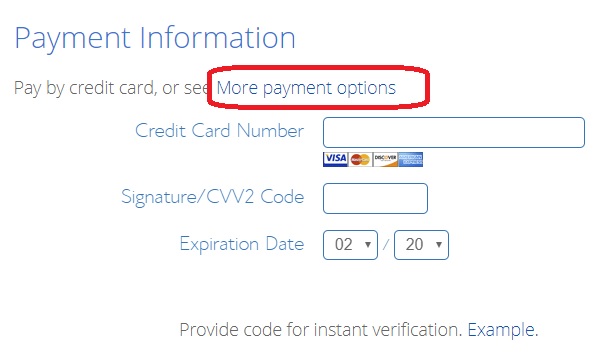
A “Pay with PayPal” button will unfold:
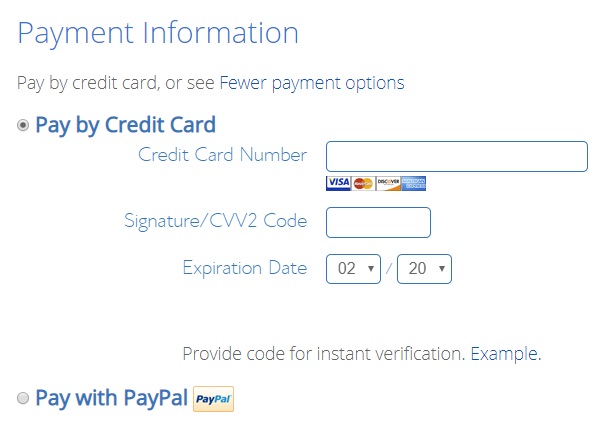
Why Bluehost would choose to hide their PayPal payment button like this is unclear to us.
You can also pay by bank transfer or check. To do that, reach out to Bluehost’s support team and express interest in one of these payment options to receive a special payment link.
Are Bluehost’s Prices Negotiable?
Although the discounted first-term prices are not subject to negotiation, it’s possible to negotiate the price of your subsequent renewal terms.
To do this, reach out to Bluehost when your first term expires and ask them for a discount. Keep in mind that the longer the subscription you decide to buy, the larger the discount you’ll receive. Based on what a support representative told us, you can expect a 10% to 20% price cut.
Further reading: hosts with negotiable prices.
Does Bluehost Offer Discounts for Non-Profits?
Unfortunately, Bluehost does not offer any special deals to non-profits – 501(c)(3) or otherwise.
We expected as much; the largest hosting companies (including GoDaddy and Hostgator) usually don’t offer discounts to specific groups of people or types of businesses.
Check out one of the hosts on our list of top providers with non-profit discounts for alternatives.
Features and Server Resources
How Much Data Transfer (Bandwidth) Do You Get?
All of Bluehost’s shared hosting plans come with unlimited data transfer.
However, although there’s no cap on how much data can be transferred between your website and its users, there’s a certain threshold of average daily traffic beyond which your website’s performance will begin to decline. This is nothing unusual – we expect this from any shared host that offers “unlimited data transfer.”
We reached out to Bluehost and asked about this threshold, and were told that they do not recommend their shared hosting for websites that regularly receive more than 3,000 users per day. This is in line with recommendations we hear from other “unlimited bandwidth” hosts.
3,000 daily visitors is a lot – the majority of websites do not receive this level of traffic even after multiple years of growth. So if you’re planning to host a new website, it will be years before this limit becomes a concern for you.
However, if your website regularly receives more than 3,000 daily users, we recommend that you look into hosting solutions with stricter server resource allocation, such as WPX and WP Engine (both are WordPress hosts). You might also benefit from considering VPS hosting instead of a shared environment.
What Server Locations are Available at Bluehost?
Currently, the only available location is in the United States (Tempe, Arizona).
This is disappointing, as many hosting providers offer at least two locations to choose from. For example, SiteGround has servers in the US, The Netherlands, and Singapore, while AccuWeb offers a choice between the USA, UK, Singapore, South Africa, and India.
If the majority of your users are located in Europe, make sure to read: best hosts with European servers.
How Much Disk Storage Space Do You Get?
| Basic | Plus | Choice Plus | Pro | |
|---|---|---|---|---|
| Storage (SSD): | 50 GB | Unlimited | Unlimited | Unlimited |
The Basic plan comes with 50 GB of storage, while the remaining plans feature unlimited disk space.
Many budget hosting providers, including A2, InterServer, and InMotion, offer unlimited storage on their lowest-tier hosting plans.
However, the 50 GB you get from Bluehost is generous and will be enough for the majority of new users, so we won’t count this limit against them.
Bluehost uses SSD drives, which are significantly faster than regular HDD (hard disk) drives. SSD drives help improve the loading speed of your website, so this is definitely a plus.
Is There an Inode Limit (Maximum Number of Files) at Bluehost?
| Basic | Plus | Choice Plus | Pro | |
|---|---|---|---|---|
| Disk space (SSD) | 200,000 | 200,000 | 200,000 | 300,000 |
Bluehost’s Inode limits are average by industry standards – most hosts have a limit between 200,000 and 300,000.
Whether these limits will be enough for you will depend on the type of website you plan to host. For example, a simple WordPress site uses around 10,000-13,000 Inodes, while a more complex and established site could take up 30,000-50,000 Inodes. Read more about WordPress Inode requirements.
If you know for a fact that your website will require more Inodes, check out our rankings of hosts with the highest Inode limits.
Overall, unless you plan to host multiple large websites, Bluehost’s Inode limits will not be a problem for you.
Is There a Limit On The Number or Size of MySQL Databases?
All four shared hosting plans come with unlimited databases. What’s more, there is no limit on how big an individual database can get.
Many popular hosting companies, including GoDaddy, InMotion, and Hostinger, limit the number of databases you can create on their cheapest shared hosting plans to a single database.
How Many Websites Can You Host?
The Basic plan is limited to one website, while the remaining three plans support unlimited sites.
No surprises here; it’s common for shared hosting companies to allow just one site on their cheapest plan. Noteworthy exceptions include InterServer and AccuWeb, both of which let you host unlimited websites on their basic plans.
If you’re in the market for hosting that supports unlimited websites, please see: affordable hosting plans with unlimited websites
Email Limits
| Basic | Plus | Choice Plus | Pro | |
|---|---|---|---|---|
| Email accounts | 5 | Unlimited | Unlimited | Unlimited |
| Sending limit | 750 / hour | 750 / hour | 750 / hour | 750 / hour |
Please note that the daily email sending limit is counted separately for each email account you create. For example, if you create five email accounts on the Basic plan, you’ll be able to send 750 x 5 = 3 750 emails per hour.
These are some of the highest email sending limits around. In fact, Bluehost ranks at the very top of our hosts with the best email sending limits rankings.
Can I Get a Dedicated IP Address (Advanced Webmasters)?
You can buy a dedicated IP from Bluehost’s marketplace for $5.99 per month.
Like the majority of Bluehost’s add-ons, this one is quite expensive. As a reference, InterServer charges $3.00/mo. for a dedicated IP, and A2 Hosting charges $4.00/mo.
Is There a Concurrent Database Connections Limit (Advanced Webmasters)?
Bluehost limits the maximum number of concurrent connections to 15 per database.
If you’re an advanced webmaster and know for a fact that your website will require a higher limit, please see: hosts with high database connection limits.
Ease of Use and Interface Functionality
Is It Easy to Install WordPress at Bluehost?
As easy as it gets: all shared hosting accounts come with WordPress (WP) preinstalled.
What’s more, Bluehost developed its own proprietary plugin, which they appropriately named Bluehost. This plugin is enabled by default and its job is to integrate your WP installation with Bluehost’s control panel to provide you with easier access to various options and statistics directly from the Bluehost dashboard (more on this below).
Bluehost’s User Interface Dashboard
Bluehost’s WordPress-centric approach is evident from the moment you log into your hosting account.
The first thing you’ll see is a list of recommended WordPress (WP) activities:

Once you’ve completed (or skipped) the checklist, head over to your profile page and click on your website’s name. This will redirect you to your Bluehost control panel:
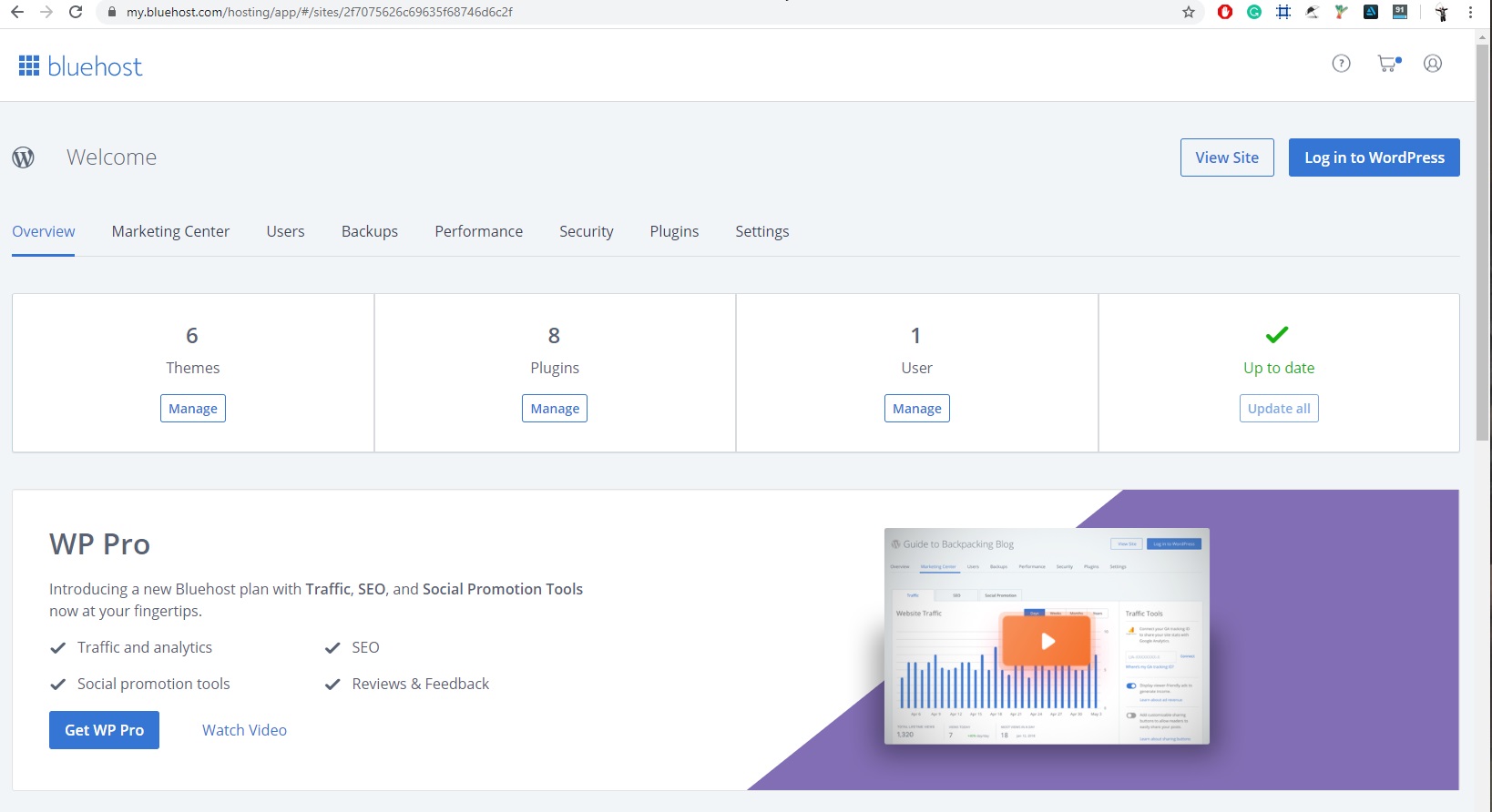
From here, you can manage your WP site’s themes, plugins, and users directly – without having to log into the main WordPress administrator dashboard. While this seems like a great feature at first glance, we don’t feel like it’s particularly useful in the grand scheme of things because you still need to log into the main WP admin dashboard in order to comprehensively manage your website.
However, this doesn’t change the fact that Bluehost’s interface is the most aesthetically pleasing one we’ve ever seen – only WPX‘s comes close. It’s transparent and intuitive.
For example, here’s a screenshot from the security tab, where you can enable and disable your SSL certificate and perform a file integrity check:
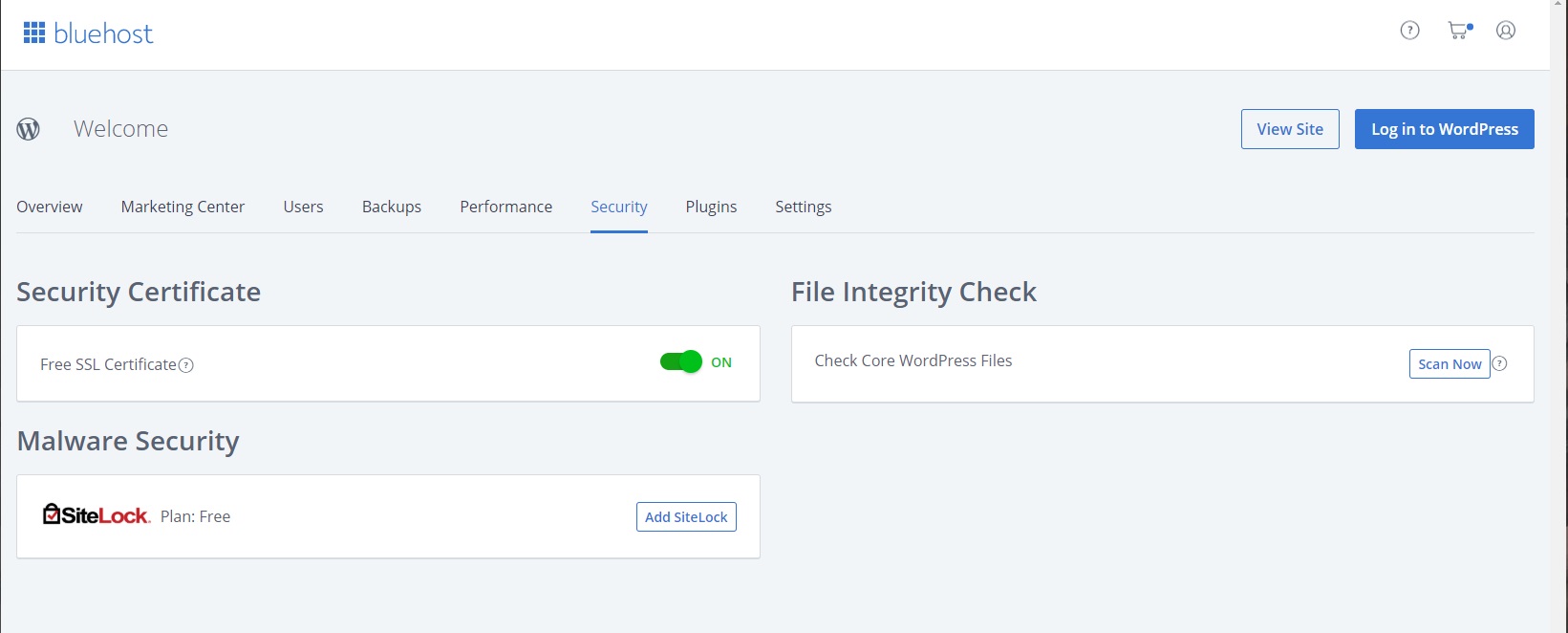
… and a screenshot from the settings tab where you can configure automatic update, manage your site’s comments rules, or delete your website:
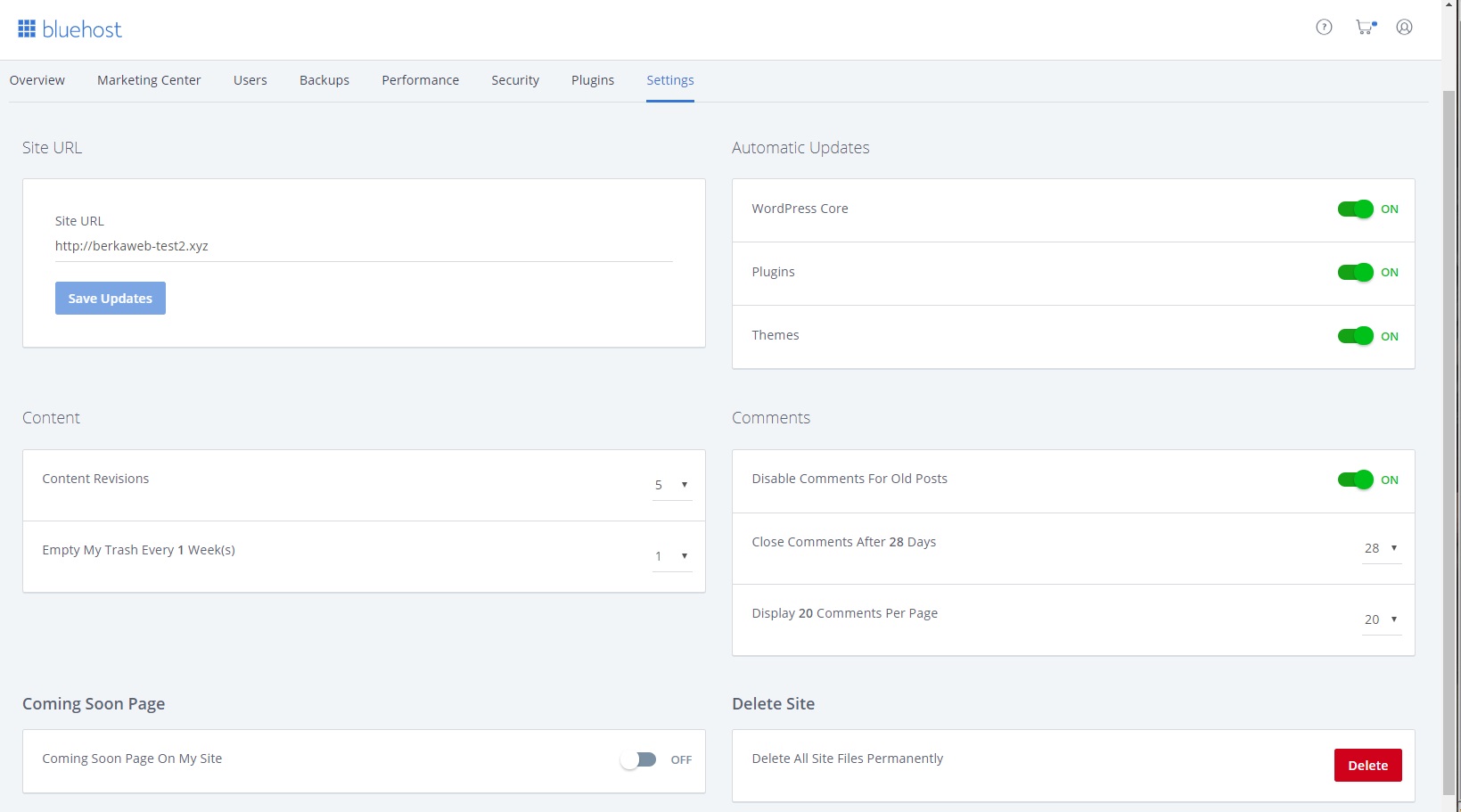
Overall, we feel that the design and usability of the dashboard is Bluehost’s strongest selling point.
Does Bluehost Shared Hosting Come With cPanel?
Most providers offer cPanel with their shared hosting plans, and Bluehost is no exception.
cPanel provides access to a variety of useful tools, including:
- A File Manager
- The Softaculous application installer
- phpMyAdmin for database management
- Email account creator
- Website statistics (visitors, data transfer usage, error logs)
And much more.
Unfortunately, there’s no drag & drop website builder available, which left us disappointed. Many hosts, including A2 and InterServer, offer a website builder for free.
What’s more, Bluehost disables the Backup & Restore wizard from CPanel by default, which fell short of our expectations – the vast majority of shared hosts leave this feature active.
How Can You Manage Your Website’s Files?
You can access your website files:
- Using the File Manager in cPanel
- Using a free FTP tool, such as Filezilla; you’ll need to create an FTP account in cPanel before you’ll be able to connect
- Advanced users can enable SSH (Secure Shell) connections in cPanel
Website Load Speed Test
We set up a test website on our Bluehost server following our standard testing procedure.
We then configured GTMetrix – a website performance tracking tool – to automatically measure our test site’s loading speed once per hour.
In total, we took 22 independent speed measurements.
Here is a summary of our tests:
- The average website loading time, calculated from all 22 measurements, was around 1.8 seconds. This is a good average – you want your website to load in 3 seconds or less for optimal user experience.
- The fastest loading time was 0.4 seconds.
- The slowest loading time was 4.5 seconds.
Here’s a chart with each of the 22 measurements:
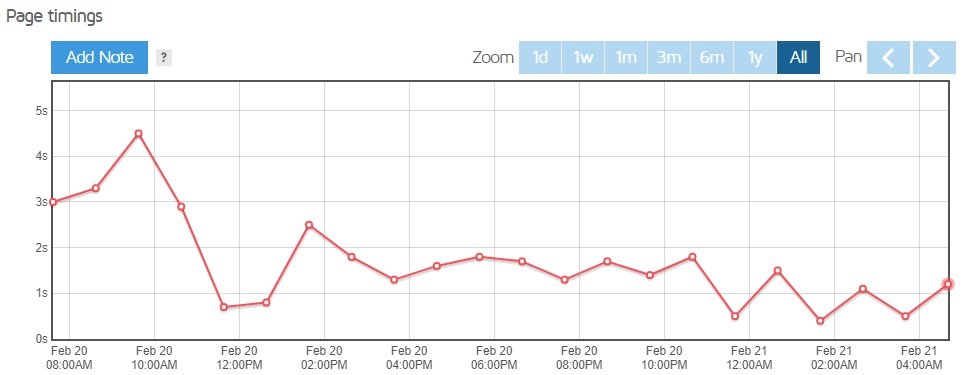
Although the average load time (1.8 seconds) is respectable, four out of the 22 measurements recorded a load time of three seconds or higher (that’s too slow!).
From this, we can extrapolate that our test website had a good loading speed around 82% of the time, and poor loading speed 18% of the time.
This is not good enough. You want your website to perform well consistently, not just “most of the time.”
Overall, this carries all the hallmarks of an overcrowded server – one that hosts more websites than it can handle.
For an illustration of how a hosting server should perform on this test, see a review of any one of the hosts we recommend on our best cheap hosting providers page.
Server Performance Under Heavy Traffic (Simulation)
In addition to performing the website load speed tests we described above, we also performed a stress test, which involves using LoadImpact to generate lots of activity on our test site.
The goal is to simulate the type of activity that our website would experience if it received a sudden influx of dozens of visitors. This gives us valuable insight into how well Bluehost’s servers manage resources.
We started by simulating activity from 50 visitors. Unfortunately, Bluehost failed miserably: our test website went offline during the test – the server could not handle 50 simultaneous visitors.
We repeated the test with 30 visitors instead of 50, with the same result.
Next, we did a 15-visitor simulation, and this went much better, but still not without the server experiencing difficulty!
It wasn’t until we performed a test with 10 visitors that Bluehost’s server was able to perform flawlessly:

The results above mean that Bluehost’s shared server is not suitable for websites that expect more than 10 simultaneous visitors.
10 users are not much, at all! Many websites – even relatively new ones – experience this level of activity during peak traffic hours.
All it takes is for someone to post a link to your website on Facebook or Twitter, and if more than 10 people click that link and begin to browse your website, your server will already be underperforming (slow page load times or pages failing to load entirely).
Overall, based on this test result alone, we don’t feel comfortable recommending Bluehost.
An exception might be if you plan to host a personal website that you will only share with friends and you know for a fact that you will never have more than 10 users browsing the website at any given time.
Safety and Security
Does Bluehost Backup Your Websites?
Bluehost takes free daily, weekly, and monthly backups. Each backup is stored only until the next backup of its type is created. For example, daily backups are stored for one day (until the next day’s backup is created).
To restore your website from a free backup, you’ll need to contact Bluehost’s support team.
Importantly, restoring a website is free of charge. This is great news, as many hosts require you to pay for a restoration. A prime example is GoDaddy with their mind-blowing $150 fee!
(Further reading: best hosts with free backups & restorations.)
Note that while Bluehost does everything in their power to create the free backups, they do not guarantee them. This shouldn’t be a problem for most users – chances that a backup won’t be available when you need it are extremely slim.
However, you can err on the side of caution by purchasing CodeGuard – Bluehost’s premium backup service. CodeGuard allows you to create backups according to your schedule. Unfortunately, it’s very expensive – between $33 and $240 per year, depending on how much backup storage you want:

Honestly, $32.95 a year for a premium backup service with just 1 GB of storage is incredibly expensive.
For comparison, consider that InterServer charges $0.05 (five cents) for 1 GB of backups. This means that for the $32.95 you pay at Bluehost for a single GB, you get over 50 GB of premium backups at InterServer.
One way to get around this incredibly steep fee is to purchase the Choice Plus hosting plan, as it comes bundled with a Basic CodeGuard subscription.
However, we don’t believe that the higher price tag on the Choice Plus justifies this decision. If you need a premium backup service, we strongly advise against Bluehost and recommend that you go with InterServer or A2 Hosting instead.
Does Bluehost Offer Free Malware Scans?
Bluehost performs free malware scans only if you put in a request via live chat; they don’t perform automatic scans for free.
As a result, we recommend that you install a free security plugin, such as WordFenceor Cerber Security, for some added real-time protection.
If Bluehost detects an infection while performing an on-demand malware scan, they’ll e-mail you a list of the infected files and take down your website until you take care of the infection.
This is standard industry practice – the vast majority of shared hosting providers do not clean up detected malware infections for free.
If you have the budget, you can pay $5.99 per month for Bluehost’s premium anti-malware application, SiteLock. A SiteLock subscription includes automatic daily scans at the file-level, as well as automatic malware removal.
Is 2-Factor Login Authentication (2FA) Available?
Yes, it is. 2FA is quickly becoming an industry-standard, which we’re very happy about because it significantly enhances the security of a hosting account.
To use two-factor authentication, install the Google Authenticator app on your Android or iOS device, then enable 2FA in the Security section of your Bluehost account by scanning the provided barcode.
Free SSL Certificates?
By default, Bluehost issues and activates a free Let’s Encrypt SSL certificate for every website you host with them.
The vast majority of hosting providers issue free certificates nowadays, so this was expected.
Additional Services and Freebies
Free Domain?
Bluehost treats all new members to a free domain voucher. The domain is valid for one year.
After the first year, Bluehost’s standard domain renewal rates apply. Here are example prices for com, net, and org extensions:
| TLD | Annual price |
|---|---|
| .com | $17.99 |
| .net | $18.99 |
| .org | $17.99 |
These are some of the highest renewal prices we’ve seen in the industry. Compare this to InterServer, which offers renewals at $11 per year.
Overall, while the free domain is nice, the expensive renewals make Bluehost’s domains unattractive – unless you are sure you won’t be needing that domain for longer than a year.
For more hosts with a free domain, check out our list of affordable hosts with a free domain.
Free Website Migration?
Unfortunately, Bluehost does not offer free migration to new users.
If you have $150 to splurge, you can purchase Bluehost’s premium website migration service. This fee covers migrating up to five websites from your old server. This is very expensive for a service that multiple hosts – including HostGator, SiteGround, and Accuweb – offer for free.
Refunds and Cancellations
Does Bluehost Offer a Money-Back Trial Period?
Bluehost offers an industry-standard 30-day money-back guarantee, which applies to all shared hosting plans regardless of the subscription duration.
If you use Bluehost’s free domain voucher, then cancel your hosting plan, an amount equal to the standard price of the domain will be subtracted from your refund. This is common practice at all hosts, just keep it in mind to avoid surprises down the line.
To receive your refund, cancel your hosting plan within 30 days, then contact Bluehost’s support team and request a full refund. See further below for a rundown of how our refund request unfolded.
If 30 days is not enough for you, take a look at our list of hosts with the longest money-back guarantee.
Can You Refund Unused Subscription Months (Pro-Rated Refunds)?
Yes, they do; Bluehost is on our fairly short list of hosts that offer pro-rated refunds. This definitely counts in their favor.
Simply cancel your hosting account at any time and contact support to request a refund for any months remaining on your subscription.
Our Refund Request, Documented
After we were done writing this review, we put Bluehost’s 30-day money-back guarantee to the test.
First, we searched for a “cancel account” option somewhere in our Bluehost dashboard, but we couldn’t find one.
So we reached out to support via live chat and requested cancellation. They emailed us a six-digit verification token, which we pasted into the chat window for authentication.
After that, the support agent requested a few more details:
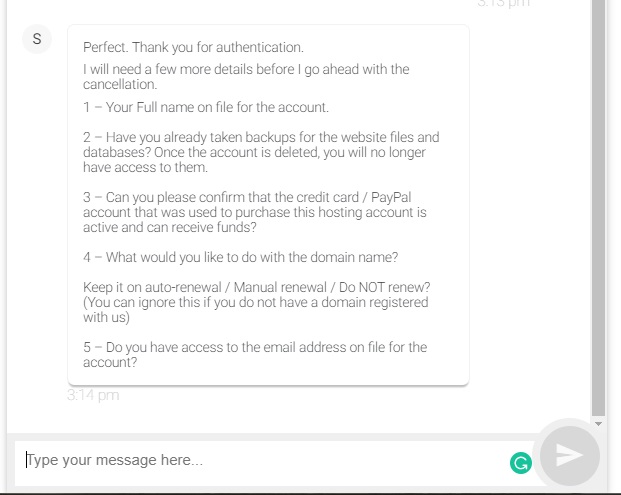
We provided the details requested, and a few minutes later, the operator confirmed cancellation.
He also told us that we should expect the refund to appear on our credit card statement within six business days.
Surely enough, a refund for the full amount paid appeared on our statement two days later.
Overall, Bluehost honored their money-back guarantee without issues.
Live Chat Customer Support Quality
Bluehost’s live chat customer service is available 24/7, and queues are very short – usually 1-3 minutes.
We connected with live chat and asked an operator over 40 questions, both for the purpose of writing this review as well as to test the support agent’s competence.
Overall, we were happy with the quality of the replies we received. The support agent was slow to reply at times (he was helping multiple customers simultaneously), but not slow enough that we felt ignored.

